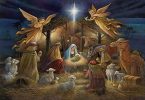24th Sunday of Ordinary Time (Year !)
Scripture: Eccl. 27:33-28:9; Ps. 102: 1-4, 9-12; Rom. 14:7-9; Mt. 18:21-35
This is an excerpt of the book, ‘Why Forgive?’ by Johann Christoph Arnold: A young policeman named Steven McDonald was shot by a teenager in New York in 1986. It left him paralyzed. While recuperating in the hospital, he thought of him; “I must forgive the shooter because the only worse thing than receiving a bullet in my spine would have been to nurture revenge in my heart.” McDonald corresponded with the young man who was serving sentence in the prison. He also expressed his hope to meet him once he was out of prison so that they could be an example to many about forgiveness. Unfortunately, the young man died in a road accident three days after his release; but McDonald still travels the country to deliver his message of forgiveness.
Today’s first reading which is taken from the Book of Sirach tells us we must forgive our neighbour if we want God to forgive us. We must be merciful to our neighbours if we want God to be merciful to us. The people of Israel always believed that God was merciful and forgiving. It was observed by Moses and all the prophets. The image of a forgiving God is prominent in the Old Testament. It is written in the book of Numbers, “The LORD is slow to anger and abounding in steadfast love, forgiving iniquity and transgression.” (Num. 14:18) It is also said in the book of Daniel, “The Lord our God is merciful and forgiving, even though we have rebelled against him.” (Dan. 9:9) Prophet Micah says, “Who is a God like you, who pardons sins and forgives the transgression of the remnant of his inheritance? You do not stay angry forever but delight to show mercy. You will again have compassion on us; you will tread our sins underfoot and hurl all our iniquities into the depths of the sea.” (Micah 7:18-19) Today’s psalm also tells us the same thing. The response says, the Lord is compassion and love, he is slow to anger and rich in mercy. (Ps. 102). If forgiveness was one of the characteristics of God in the Old Testament, then God’s forgiveness is personified in Jesus Christ.
Jesus was born to forgive us and the forgiveness was paramount teaching to Jesus. The word appears only in the New Testament more than 140 times in different forms. Jesus made forgiveness as mandatory to receive forgiveness from God. He taught forgiveness through parables. He also forgave all those who came to him. He told the paralytic, your sins are forgiven (Mk. 2:5), when a sinful woman bathed Jesus’ feet with her tears and wiped them with her hair, Jesus said, ‘your sins are forgiven’ (Lk. 7:48). When a woman was caught in adultery, he said, ‘I do not condemn you’ (Jn. 8:11), Jesus forgave the repentant thief on the cross, ‘today you will be with me in paradise’ (Lk. 23:43).
Jesus forgave those who sinned against him directly. He prayed on the cross, ‘Father, forgive them’ (Lk. 23:34). After the resurrection, Jesus never reprimanded his disciples for their unfaithfulness but greeted them with ‘peace be with you’. (Jn. 20: 19, 21, 26). Jesus also breathed on them the Holy Spirit and gave them the power to forgive sins. (Jn. 20:22-23).
In today’s Gospel, Jesus teaches Peter one of the greatest lessons on forgiveness. Peter asked how often he must forgive his wrongdoer. He thought seven times would be greater than the rabbis who taught them three offences were forgiven and the fourth offence was punishable. Jesus tells him not seven times but seventy times seven to forgive. Luke, the Evangelist will make it more simple by saying if someone turns to you seven times after sinning against you then you must forgive. In other words, there was an invitation to go beyond the number. Forgiveness should not be counted. It should be given without any condition.
Jesus elaborates this point with a parable. The master forgave a man who owed him ten thousand talents. A talent was worth 15yrs daily wages of the worker in those days. The first servant would have taken more than 400 years to pay his debts. Against his debt, the second servant had a debt of just one hundred denarii. It would have been little more than three month’s daily wages. The first servant was forgiven for his debt of 400 years of daily wages but the second servant was put into prison for a debt of three month’s wages. This was a gross injustice.
Now let us relate to this parable. The master in the parable is God who forgives us for all our wrongdoing. God forgives our huge debt which we have been making every day by committing sins against Him and our fellow brothers and sisters. God has paid our debts by letting His Son die on the cross. God has paid the ransom for our debt through the blood of Jesus on the cross. If God has forgiven our debts of sins, then can we not forgive our own brothers and sisters whose debt is nothing compared to our debt before God.
There are several lessons that we can learn from today’s liturgy. Firstly, if we forgive others their wrongdoings, then our heavenly Father will also forgive our sins; we pray it in the Our Father. Secondly, we will become the instrument of God’s forgiveness to others. Thirdly, we must forgive without any condition and counting. Fourthly, forgiveness will bring healing to our physical and psychological health.
This is applicable to our family life. Pope Francis says, without forgiveness, our families will become the theatre of conflicts and bastion of grievances. Forgiveness is vital to our emotional health and spiritual survival. Anyone who does not forgive has no peace of soul and communion with God. Anger brings pain into our lives. It is poison. It destructs our lives. Maintaining hurts, anger, revenge in hearts sickens our physical, emotional and spiritual life.
Forgiveness brings joy and healing. Steven McDonald forgave the young shooter. He is at peace even though he has become a paralytic. He is going around the world to preach about forgiveness. Jesus forgave us on the cross. He has become the symbol of God’s forgiveness. Today’s liturgy calls us to be a symbol of forgiveness in the present world and especially to our families. God wants us to bring healing to this wounded world. God wants us to bring fragrance in the world. It is said, forgiveness is the fragrance that flower breaths when they are trampled upon. Let us rejoice when we are trampled upon, insulted, humiliated, belittled by others; we are given a chance to breathe out the fragrance of God’s forgiveness.






